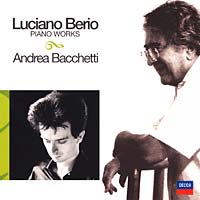

Feature article by
Art Lange
 BERIO
Petite Suite. 5 Variazione. Sequenza IV. Rounds. Brin. Leaf. Wasserklavier. Erdenklavier.
Luftklavier. Feuerklavier • Andrea Bacchetti (pn) • DECCA 476 194-4 (43:33)
BERIO
Petite Suite. 5 Variazione. Sequenza IV. Rounds. Brin. Leaf. Wasserklavier. Erdenklavier.
Luftklavier. Feuerklavier • Andrea Bacchetti (pn) • DECCA 476 194-4 (43:33)
 There is a revealing comment in Andrea Bacchetti's memoir of Luciano Berio, included in
this CD's booklet, where the then-teenaged pianist-he met and began an informal study
with the composer at the age of 12-gave a performance of the six brief "encores"
and was told by Berio that his playing was "too romantic, not aggressive enough."
This criticism gave Bacchetti a direction he followed throughout his continued preparation
of these works, and which characterizes his approach on this disc (which was recorded
between 2000 and 2001) - a vigorous, nearly athletic attack that emphasizes the music's
angularity, abrupt shifts, and dramatic contrasts rather than its innate lyricism.
This was apparently Berio's preference, his chosen identification with the innovations of
mid-century Modernism, despite the metaphoric tug-of-war with the past he engaged in for
years, and which gave an ironic and occasional erratic tension to many of his scores.
There is a revealing comment in Andrea Bacchetti's memoir of Luciano Berio, included in
this CD's booklet, where the then-teenaged pianist-he met and began an informal study
with the composer at the age of 12-gave a performance of the six brief "encores"
and was told by Berio that his playing was "too romantic, not aggressive enough."
This criticism gave Bacchetti a direction he followed throughout his continued preparation
of these works, and which characterizes his approach on this disc (which was recorded
between 2000 and 2001) - a vigorous, nearly athletic attack that emphasizes the music's
angularity, abrupt shifts, and dramatic contrasts rather than its innate lyricism.
This was apparently Berio's preference, his chosen identification with the innovations of
mid-century Modernism, despite the metaphoric tug-of-war with the past he engaged in for
years, and which gave an ironic and occasional erratic tension to many of his scores.For example, his piano works can be divided into two groups, the confrontational abstractions of Cinque Variazione (1952-53), Sequenza IV (1965-66), and Rounds (1967), and the evocative morsels that comprise the Petite Suite (1947) and the remaining so-called Six Encores-actually an arbitrary grouping of miniatures, each examining a single compositional premise, designed between 1965 and 1990. (This does not take into account the 20-minute sonata Berio composed in 2001, after Bacchetti had completed this recording.) In the Petite Suite, a student essay on neoclassical dance forms, and the later pieces like Wasserklavier, a meditation on Brahms and Schubert, or Brin and Leaf, delicate and ethereal, respectively, pianist David Arden (who also recorded all but the sonata, for New Albion) focuses on the music's stylistic sources and consequently uncovers echoes of Berio's influences-Poulenc, Ravel, Debussy, even Stockhausen in the percussive Sequenza IV. But Bacchetti takes a different tack, adding an additional layer of irony to the 18th-century dances by surging through them with panache, projecting single notes like laser beams in Erdenklavier, uncovering the transformational qualities in Wasserklavier, in each case asserting that this is Berio's music and not a product of the past. Then too, he sweeps through the Cinque Variazione (this appears to be the original version of 1953, not the extended revision of 1966 that Arden recorded), his lean, biting tone articulating the knotty phrases with exceptional clarity and transparency, and intensifies Sequenza IV with crisp, animated flurries balanced by interludes of poised restraint.
I haven't heard the interpretations by Andrea Lucchesini (Avie), which Robert Carl praised in Fanfare 30:6, but, having been previously satisfied with Arden's point of view, I'm happy to experience an equally convincing account that considers the music from such a different perspective. It makes me wonder if Bacchetti brings the same fervor to his recordings of Bach. Art Lange
This article originally appeared in Issue 34:1 (Sept/Oct 2010) of Fanfare Magazine
read more: Jens F. Laurson (Interview) -
Colin Clarke (Featured article)